Timeline: Key Events in U.S. History that Defined Generations
By Iman Ghosh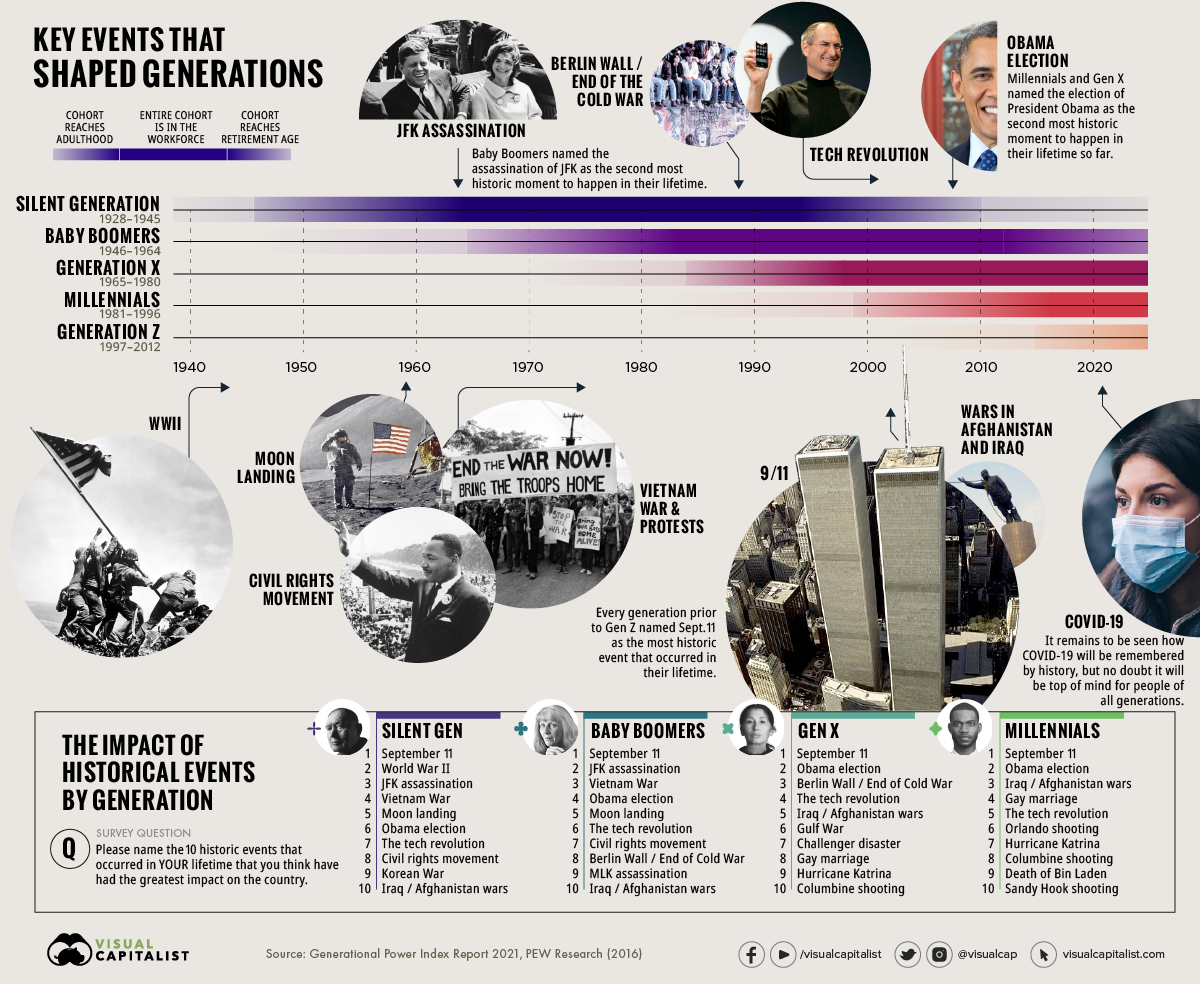
Key Events in U.S. History that Defined Generations
Looking back at history is a necessity when trying to understand what the future may hold.
Using insights from our Generational Power Index 2021 report, along with survey data from Pew Research in 2016, we identified some key milestones for each cohort, to understand how these events helped shape each generation’s unique perspectives.
Quick Context on Generational Definitions
Before diving in, it’s important to clarify which generations we’ve included in our research, along with their age and birth year ranges.
| Generation | Age range (years) | Birth year range |
|---|---|---|
| The Silent Generation | 76 and over | 1928-1945 |
| Baby Boomers | 57-75 | 1946-1964 |
| Gen X | 41-56 | 1965-1980 |
| Millennials | 25-40 | 1981-1996 |
| Gen Z | 9-24 | 1997-2012 |
| Gen Alpha | 8 and below | 2013-present |
These generational categories aren’t universal, but we went with the most widely cited definitions from reputable U.S. sources including the Pew Research and the U.S. Federal Reserve. It’s also worth noting that these generational definitions are somewhat specific to North America. For this reason, the focus is on U.S. historic events.
Defining Events: Silent Generation
The oldest members of the Silent Generation were 11 years old at the start of World War II, and were teenagers by the time it ended. In other words, their formative years fell smack dab in the middle of one of the biggest international conflicts in modern history.
Because of this, it makes sense that World War II ranks as the second most impactful event in their lifetimes, trailing only the far more recent Sept. 11 terrorist attacks (2001).
Most Impactful Historic Events, Silent Gen (Survey Results)
| Rank | Silent Gen | Survey % |
|---|---|---|
| #1 | Sept. 11 | 59% |
| #2 | WWII | 44% |
| #3 | JFK Assassination | 41% |
| #4 | Vietnam War | 37% |
| #5 | Moon landing | 29% |
| #6 | Obama election | 28% |
| #7 | The tech revolution | 27% |
| #8 | Civil rights movement | 18% |
| #9 | Korean War | 18% |
| #10 | Iraq/Afghanistan wars | 14% |
In fact, the Silent Generation cited four different wars on their list, more than any other cohort. For context, Boomers identified three conflicts (including the Cold War), while Millennials only referenced one (Iraq/Afghanistan).
Of course, other not-so-violent events made the list as well. And interestingly, some of these impressionable moments occurred later on in life.
For example, the youngest members of The Silent Generation were already in their mid-t0-late forties when cellphones became common in the ‘90s—yet, 27% identified the tech revolution as one of the top 10 most impactful events that happened in their lifetime.
Clearly, life never stops throwing you curve balls—no matter how far along you might be.
Most Notable Historical Events: Baby Boomers
Many of the historical experiences cited by Baby Boomers were related to war and violent acts. For instance, Boomers identified two assassinations on their list—John F. Kennedy’s in 1963, and Martin Luther King’s in 1968.
Most Impactful Historic Events, Boomers (Survey Results)
| Rank | Baby Boomers | Survey % |
|---|---|---|
| #1 | Sept. 11 | 70% |
| #2 | JFK Assassination | 45% |
| #3 | Vietnam War | 41% |
| #4 | Obama election | 38% |
| #5 | Moon landing | 35% |
| #6 | The tech revolution | 26% |
| #7 | Civil rights movement | 18% |
| #8 | Fall of Berlin Wall/end of Cold War | 16% |
| #9 | MLK assassination | 15% |
| #10 | Iraq/Afghanistan wars | 11% |
For this generation, the moon landing in 1969 made the cut, as did Barack Obama’s election win in 2008.
Baby Boomers only identified one event that was unique to their cohort (Martin Luther King’s death). It’s worth noting that responses varied between Americans of different racial backgrounds. Not surprisingly, Black Americans were far more likely to name MLK’s death as a top defining moment.
Most Notable Historical Events: Gen X
For Gen Xers, two unique events made their list: the Challenger disaster (1986) and the Gulf War (1991). Interestingly, neither of of these events stood out for other generations.
The Challenger disaster impact was widely felt because it involved civilians alongside astronauts, making the space shuttle’s explosion all the more notorious.
Most Impactful Historic Events, Gen Xers (Survey Results)
| Rank | Gen X | Survey % |
|---|---|---|
| #1 | Sept. 11 | 79% |
| #2 | Obama election | 40% |
| #3 | Fall of Berlin Wall/end of Cold War | 21% |
| #4 | The tech revolution | 20% |
| #5 | Iraq/Afghanistan wars | 18% |
| #6 | Gulf War | 15% |
| #7 | Challenger disaster | 14% |
| #8 | Gay marriage | 10% |
| #9 | Hurricane Katrina | 10% |
| #10 | Columbine shooting | 9% |
| #11 | Orlando shooting | 9% |
| #12 | Oklahoma City bombing | 9% |
Hurricane Katrina (which occurred in 2005) is the only natural disaster to make it on any of these lists. The hurricane—which caused a significant share of New Orleans’ population to resettle—left a lasting impression on the nation.
Most Notable Historical Events: Millennials
Millennials remember the September 11 attacks the most of all generations, with 86% citing it as their most influential event. They also paid close attention to the aftermath of this occurrence, as marked by the inclusion of both the Iraq/Afghanistan wars and the death of Osama Bin Laden among their most notable events.
Most Impactful Historic Events, Millennials (Survey Results)
| Rank | Millennials | Survey % |
|---|---|---|
| #1 | Sept.11 | 86% |
| #2 | Obama election | 47% |
| #3 | Iraq/Afghanistan wars | 24% |
| #4 | Gay marriage | 19% |
| #5 | The tech revolution | 18% |
| #6 | Orlando shooting | 17% |
| #7 | Hurricane Katrina | 11% |
| #8 | Columbine shooting | 10% |
| #9 | Bin Laden | 10% |
| #10 | Sandy Hook | 7% |
| #11 | Boston Marathon bombing | 7% |
| #12 | Great Recession | 7% |
Sadly, a lot of Millennials recollect instances of gun violence more than any other generation, from Orlando and Columbine to Sandy Hook.
Last but not least, Millennials are the only generation to note the Global Financial Crisis of 2008, and the subsequent Great Recession, as a momentous event. This makes sense considering many of them began their careers in its aftermath.
Gen Z and Younger
The Pew Research survey data was collected in 2016, so opinions on more recent events have not been collected.
That said, it could be premature to say in the short term which events will leave a lasting impression on generations, young and old.
According to the above data, the election of Barack Obama was a lasting milestone in recent history. Will the election of Donald Trump leave a similar impact? How will COVID-19 be regarded in the future? Time will tell which events will define future generations.
Moments, Movements, and Everything in Between
One key takeaway worth emphasizing is just how varied these formative events can be. Some were experienced as a single moment, while others were a culmination of shifts over several years.
It’s also clear that timing and duration are not the only determining factors behind an event’s influence on American society. For example, the moon landing was a tangible moment with a date stamp, whereas the tech revolution has a much fuzzier start (before exploding in significance alongside the Dotcom boom and bust).
Also interesting is what is absent from the top results. For example, the Global Financial Crisis of 2008 is barely referenced.
In short, a variety of impactful events and more gradual revolutions have made their mark on American society. Some have influenced specific generations, while others have transcended generational boundaries and unified the American public.
Download the Generational Power Report (.pdf)
For a full methodology of how we built the Generational Power Index, see pages 28-30 in the report PDF. This is the first year of the report, and any feedback is welcomed.
Politics
Which Generation Has the Most Influence Over U.S. Politics?
Visual Capitalist’s inaugural Generational Power Index (GPI) examines the political power held by each generation and their influence on society.Published
23 hours agoon
May 7, 2021
Measuring Influence in U.S. Politics, by Generation
Generations are a widely recognized and discussed concept, and it’s assumed people all understand what they refer to. But the true extent of each generation’s clout has remained undetermined—until now.
In our inaugural Generational Power Index (GPI) 2021, we examine the power and influence each generation currently holds on American society, and its potential to evolve in the future.
Political power by generation was one of three key categories we used to quantify the current landscape. Before we dive into the results, here’s how the Political Power category was calculated.
Measuring Generational Power
To begin with, here’s how we categorized each generation:
| Generation | Age range (years) | Birth year range |
|---|---|---|
| The Silent Generation | 76 and over | 1928-1945 |
| Baby Boomers | 57-75 | 1946-1964 |
| Gen X | 41-56 | 1965-1980 |
| Millennials | 25-40 | 1981-1996 |
| Gen Z | 9-24 | 1997-2012 |
| Gen Alpha | 8 and below | 2013-present |
Using these age groups as a framework, we then calculated the Political Power category using these distinct equally-weighted variables:
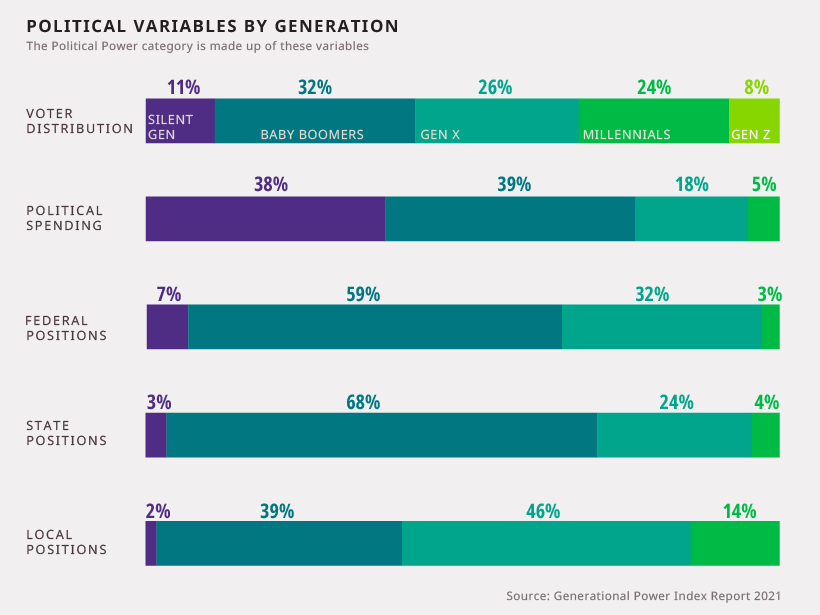
With this methodology in mind, here’s how the Political Power category shakes out, using insights from the GPI.
Share of Political Power by Generation
Baby Boomers dominated with over 47% of the total political power by generation. This cohort has particular strength in the judicial system and in Congress.
| Generation | Political Power Share |
|---|---|
| Baby Boomers | 47.4% |
| Gen X | 29.0% |
| Millennials | 10.0% |
| Silent | 12.1% |
| Gen Z | 1.6% |
Baby Boomers, along with the Silent Generation also control 80% of political spending. Meanwhile, Gen X accounts for nearly half (46%) of local government positions.
Both voters and politicians play key roles in shaping American society. Thus, two variables worth looking closer at are the evolving electoral base and the composition of Congress.
The Changing Face of the U.S. Voter
Younger generations have very different perceptions on everything from cannabis to climate change. This is starting to be reflected in legislation.
2016 was a watershed moment for politicians vying for the vote—it was the last election in which Baby Boomers made up over a third of U.S. voters. Collectively, Boomers’ voting power will decline from here on out.
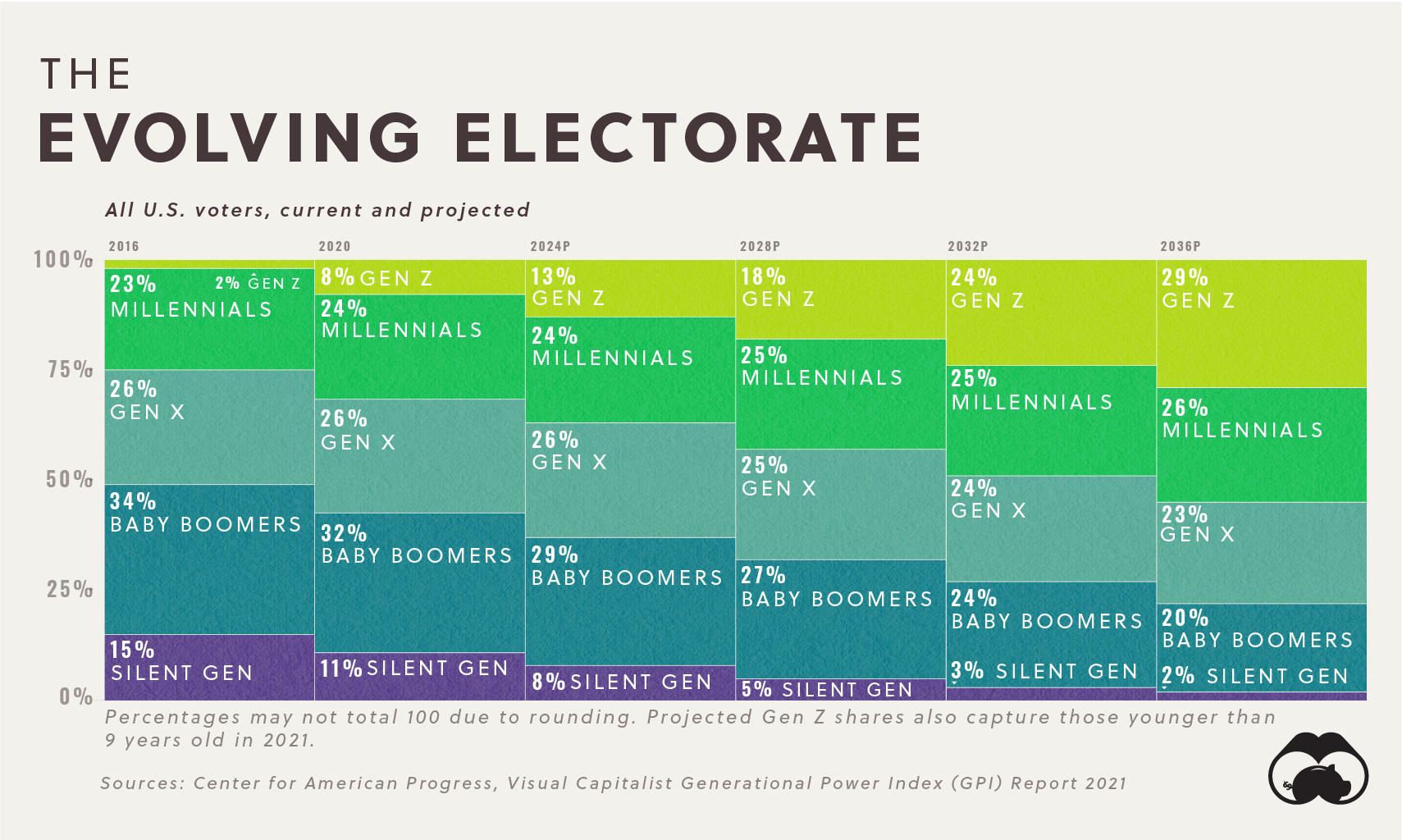
Within the next two decades, the combined voting power of Millennials and Gen Z will skyrocket from 32% in 2020 up to 55% by 2036.
Meanwhile, a decade from now, the oldest members of Gen Alpha (those born in 2013 and later) will enter the playing field and become eligible to vote in 2031.
The View from the Top
Having examined generational power in the electorate, we now turn our attention to the people on the other side of the democratic equation—the politicians.
In most cases, it takes many decades of experience and reputation building to reach the highest offices in the land. That’s why the median age of Congress (61.2) is much higher than the median age of the U.S. population at large (38.1).
At this point in time, Baby Boomers are in the sweet spot, and it shows in the numbers. Boomers represent 298 of 532 Congressional seats (56% of all seats), and Gen X’s growing contingent of members represents 31%.
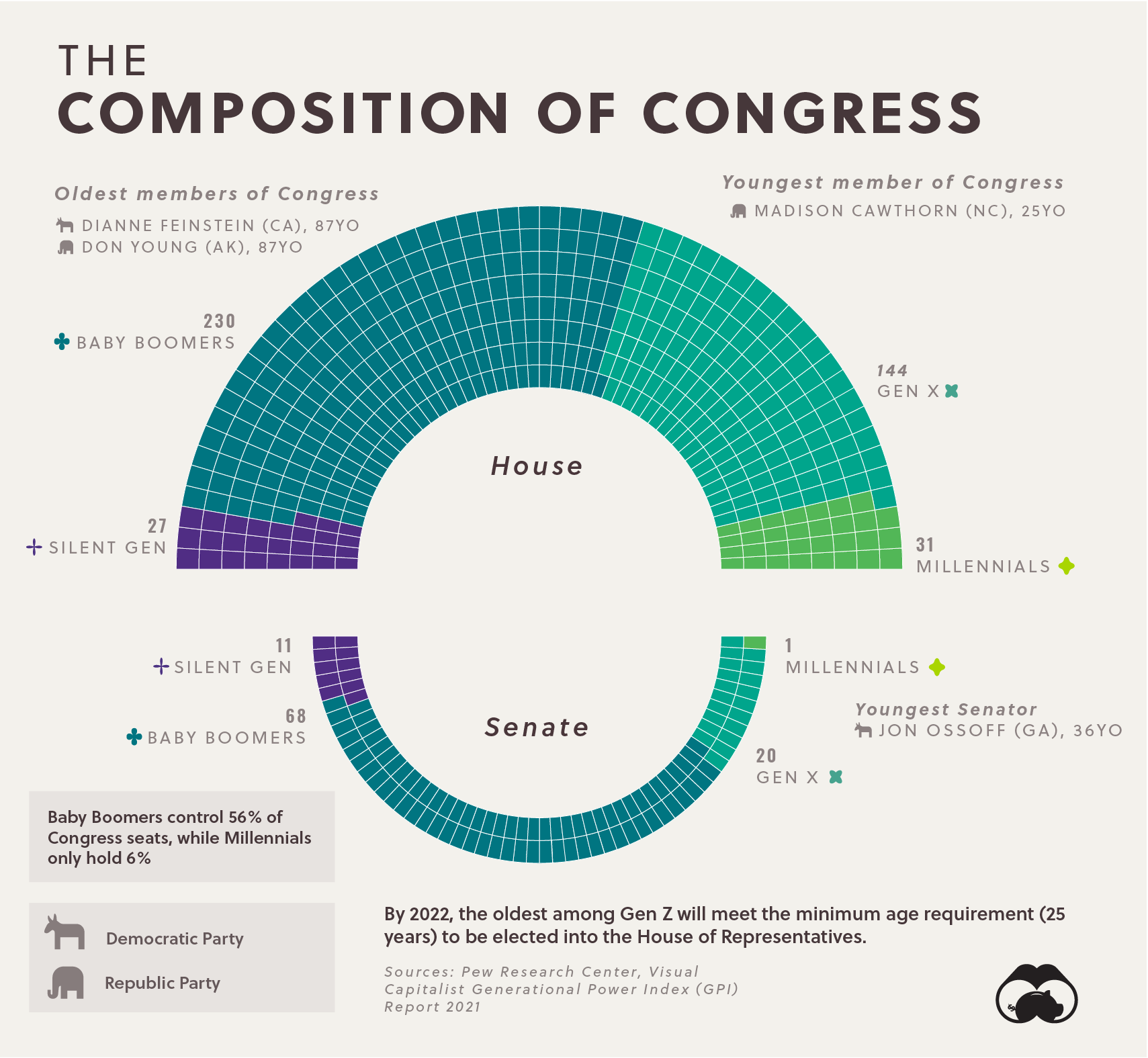
On one end of the spectrum, the Silent Generation still occupies 7% of seats, which roughly reflects the group’s share of the U.S. population. California’s Democratic Senator Dianne Feinstein and Republican Don Young are both 87 years old, the latter having represented Alaska for 25 terms.
On the other end of the spectrum, Millennials currently claim 32 seats, just 6% of the total. As of 2021, this entire cohort now meets the minimum age requirement (25) to serve in the House of Representatives. The youngest member of Congress is Republican Madison Cawthorn, a representative for North Carolina at just 25 years old. Meanwhile, Senator Jon Ossoff is the youngest Senator in the country, serving Georgia at 36 years old.
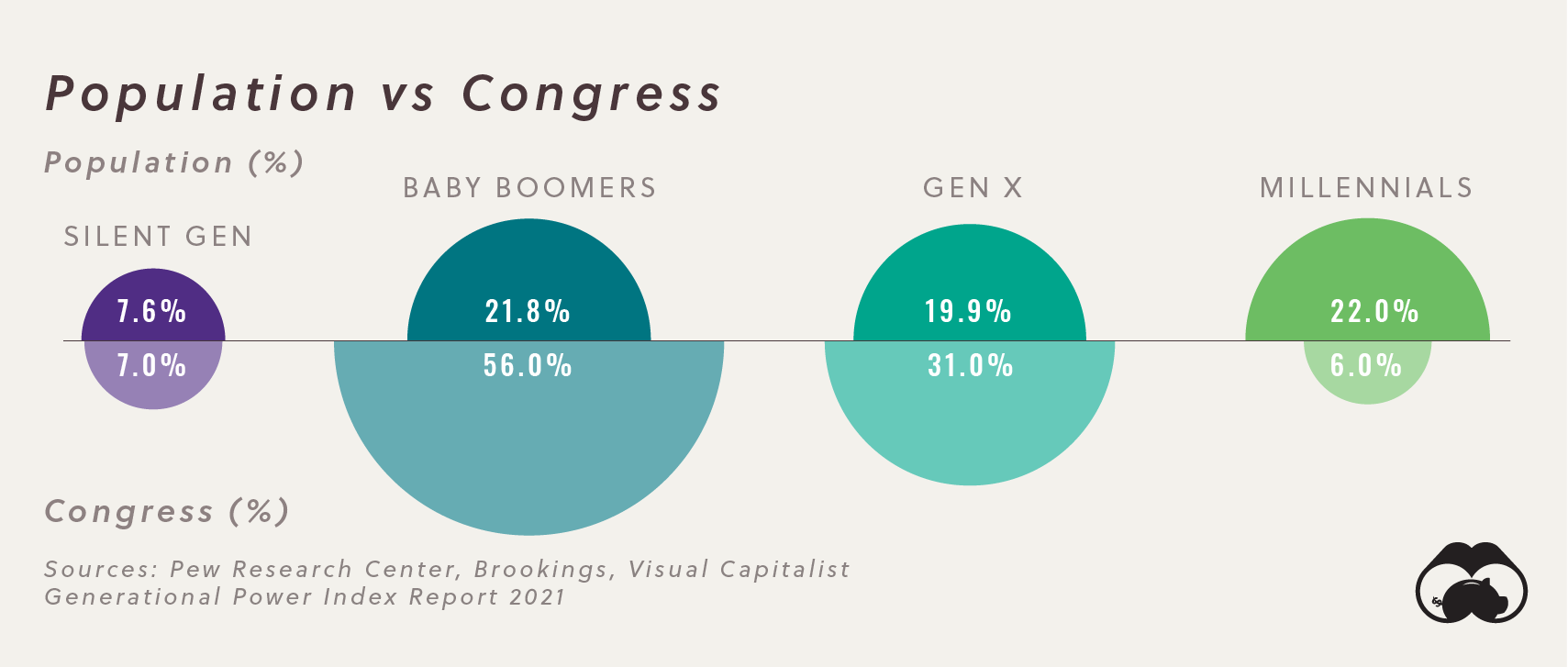
This difference in political power by generation is stark considering that both Boomers and Millennials both make up similar proportions of the U.S. population at large. In that sense, Millennials are greatly underrepresented in Congress compared to Boomers.
Gen Z Waiting Patiently in the Wings
Gen Z’s current age range is a natural reason why they don’t yet have a foothold in government. But by 2022, the oldest members of Gen Z will turn 25, meeting the minimum age requirement to get elected into the House of Representatives.
With the oldest members of this generation soon turning 25, how long will it be before a representative from Gen Z occupies a seat in the Capitol Building?
Download the Generational Power Report (.pdf)
Demographics
Ranking U.S. Generations on Their Power and Influence Over Society
Using data from our new Generational Power Index, we look at how much economic, political, and cultural power each U.S. generation holds.Published
2 days agoon
May 6, 2021
Which U.S. Generation has the Most Power and Influence?
We’re on the cusp of one of the most impactful generational shifts in history.
As it stands, the Baby Boomers (born 1946-1964) are America’s most wealthy and influential generation. But even the youngest Boomers are close to retirement, with millions leaving the workforce every year. As Baby Boomers pass the torch, which generation will take their place as America’s most powerful?
In our inaugural Generational Power Index (GPI) for 2021, we’ve attempted to quantify how much power and influence each generation holds in American society, and what that means for the near future.
Download the Generational Power Report (.pdf)
Generation and Power, Defined
Before diving into the results of the first GPI, it’s important to explain how we’ve chosen to define both generations and power.
Here’s the breakdown of how we categorized each generation, along with their age ranges and birth years.
| Generation | Age range (years) | Birth year range |
|---|---|---|
| The Silent Generation | 76 and over | 1928-1945 |
| Baby Boomers | 57-75 | 1946-1964 |
| Gen X | 41-56 | 1965-1980 |
| Millennials | 25-40 | 1981-1996 |
| Gen Z | 9-24 | 1997-2012 |
| Gen Alpha | 8 and below | 2013-present |
The above age brackets for each generation aren’t universally accepted. However, since our report largely focuses on U.S. data, we went with the most widely cited definitions, used by establishments such as Pew Research Center and the U.S. Federal Reserve.
To measure power, we considered a variety of factors that fell under three main categories:
- Economic Power
- Political Power
- Cultural Power
We’ll dive deeper into each category, and which generations dominated each one, below.
Overall Power, By Generation
Baby Boomers lead the pack when it comes to overall generational power, capturing 38.6%.
| Generation | Overall Power Share |
|---|---|
| The Silent Generation | 12.8% |
| Baby Boomers | 38.6% |
| Gen X | 30.4% |
| Millennials | 14.5% |
| Gen Z | 3.7% |
| Gen Alpha | 0.0% |
| Total | 100.0% |
While Boomers hold the largest share of power, it’s interesting to note that they only make up 21.8% of the total U.S. population.
Gen X comes in second place, capturing 30.4% of power, while Gen Z ranks last, snagging a mere 3.7%. Gen Alpha has yet to score on the ranking, but keep in mind that the oldest members of this generation will only be eight years old this year—they haven’t even reached double digits yet.
Generational Power: Economics
Considering that Baby Boomers hold nearly 53% of all U.S. household wealth, it makes sense that they dominate when it comes to our measurement of Economic Power.

At 43.4%, the GPI shows that Boomers hold more economic influence than Gen X, Millennials, and Gen Z combined. They make up a majority of business leaders in the U.S., and hold 42% of billionaire wealth in America.
Timing plays a role in the economic prosperity of Baby Boomers. They grew up in a post-WWII era, and spent their primary working years in a relatively stable, prosperous economy.
In contrast, Millennials entered the workforce during the Great Recession and have seen only tenuous economic and wage growth, impacting their ability to accumulate wealth. Combine this with crippling amounts of student debt, and it’s no surprise that Millennials have nearly 50% less wealth than other generations (Boomers, Gen X) at a comparable age.
Generational Power: Political
In addition to holding the most Economic Power in the GPI, Baby Boomers also rank number one when it comes to Political Power.
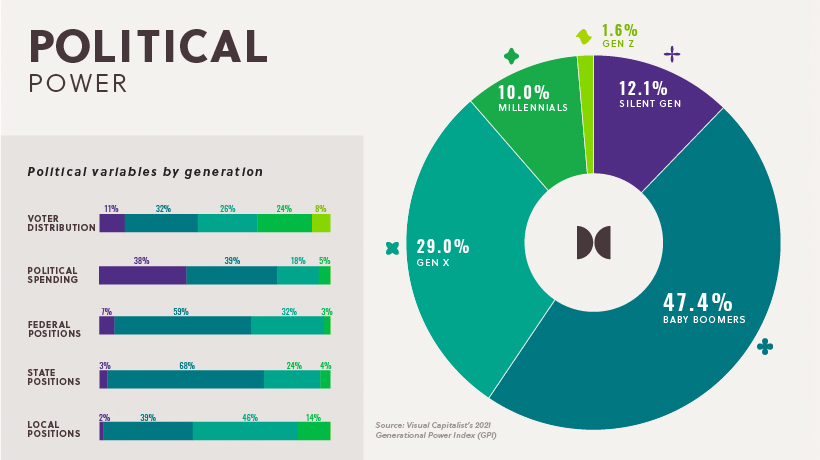
Boomers capture 47.4% of political influence. This generation accounts for 32% of all U.S. voters, and holds the majority of federal and state positions. For instance, 68% of U.S. senators are Baby Boomers.
Political spending on election campaigns and lobbying predominantly comes from Boomers, too. When it comes to money spent on lobbying, we found that 60% of the top 20 spenders were from organizations led by Baby Boomers.
In contrast, Millennials and Gen Zers barely make a splash in the political realm. That said, in the coming years, it’s estimated that the combined voting power of Millennials and Gen Z will see immense growth, rising from 32% of voters in 2020 up to 55% by 2036.
Cultural Power
There is one category where other generations gave Boomers a run for their money, which is in Cultural Power.
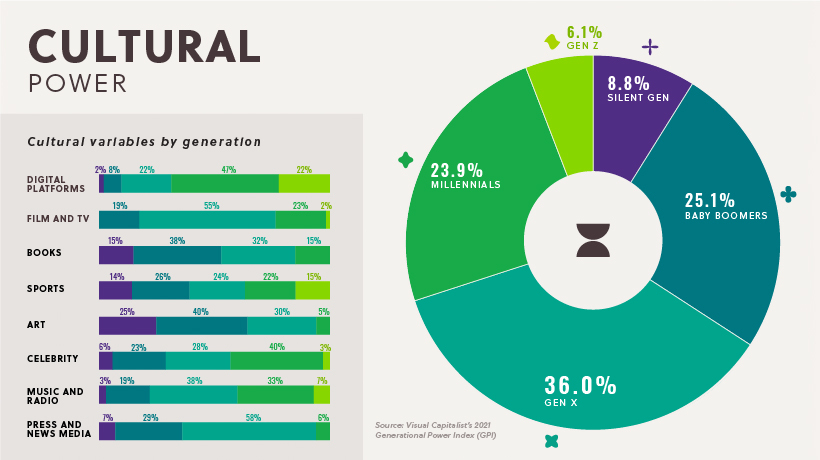
In this category, it’s actually Gen X that leads the pack, capturing 36.0% of Cultural Power. Gen X is especially dominant in press and news media—over half of America’s largest news corporations have a Gen Xer as their CEO, and a majority of the most influential news personalities are also members of Gen X.
Despite a strong showing in our culture category, Gen X falls short in one key variable we looked at—the digital realm. On digital platforms, Millennials dominate when it comes to both users and content creators, and Gen Z has growing influence here as well.
The Future of Generational Power
Generational power is not stagnant, and it ebbs and flows over time.
As this process naturally plays out, our new Generational Power Index and the coinciding annual report will aim to help quantify future shifts in power each year, while also highlighting the key stories that exemplify these new developments.
For a full methodology of how we built the Generational Power Index, see pages 28-30 in the report PDF. This is the first year of the report, and any feedback is welcomed.
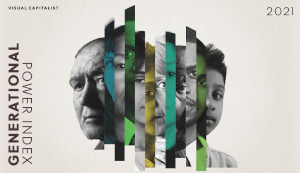

No comments:
Post a Comment